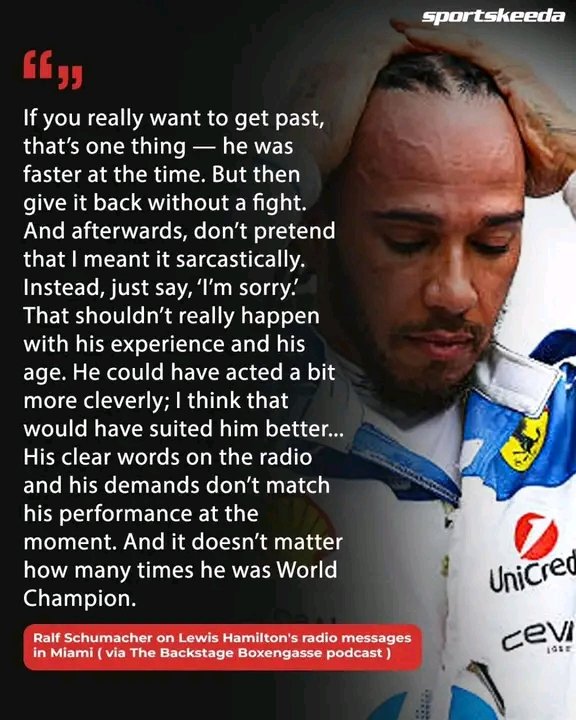Seven-time Formula 1 World Champion Lewis Hamilton’s radio outbursts during the recent Miami Grand Prix have drawn sharp criticism from former driver Ralf Schumacher. Schumacher, known for his own fiery on-track personality during his career, took aim at Hamilton’s repeated complaints about car performance and team strategy relayed over the team radio, deeming them unprofessional and detrimental to the team’s overall performance. He argued that such public displays of frustration undermine the team’s unity and could negatively impact the morale of the mechanics and engineers working tirelessly behind the scenes. Schumacher highlighted the contrast between Hamilton’s vocal discontent and the generally composed demeanor of other drivers facing similar challenges.
The crux of Schumacher’s criticism centers on the perceived lack of professionalism displayed by Hamilton. He emphasized that while drivers undoubtedly experience immense pressure and frustration during races, venting publicly through team radio broadcasts creates an unnecessary distraction and potentially jeopardizes team strategy. Schumacher suggested that a more measured and private approach to addressing performance issues would be more beneficial, both for Hamilton and the Mercedes team. He pointed to the importance of maintaining a calm and collected demeanor, even under extreme pressure, to ensure optimal team performance and avoid negatively impacting the overall race strategy.
Schumacher’s comments come amidst a difficult season for Mercedes, who are struggling to match the pace of Red Bull and Ferrari. Hamilton’s struggles, combined with his vocal frustrations, have amplified the scrutiny surrounding the team’s performance. The German driver suggested that Hamilton, a veteran of the sport with years of experience managing pressure, should be setting a better example for younger drivers. He called on Hamilton to adopt a more positive and constructive approach, focusing on working collaboratively with the team to overcome their current challenges rather than publicly airing grievances.
However, some argue that Schumacher’s criticism is overly harsh, given the intense pressure Hamilton faces and the clear performance issues plaguing the Mercedes car. They suggest that the radio messages reflected genuine frustration with a car that is consistently underperforming, and that his passion should not be misinterpreted as a lack of professionalism. The debate highlights the fine line between expressing frustration and maintaining a professional image within the high-pressure environment of Formula 1.
Ultimately, the controversy underscores the inherent tensions within Formula 1 teams, where the pressure to perform is immense and individual personalities often collide. While Schumacher’s criticism reflects a traditionalist view of driver conduct, it also raises important questions about the balance between expressing genuine emotions and maintaining a cohesive team dynamic, particularly during periods of intense competition and underperformance. The coming races will be crucial in observing how Hamilton responds to this public critique and whether his approach to team communication evolves.
